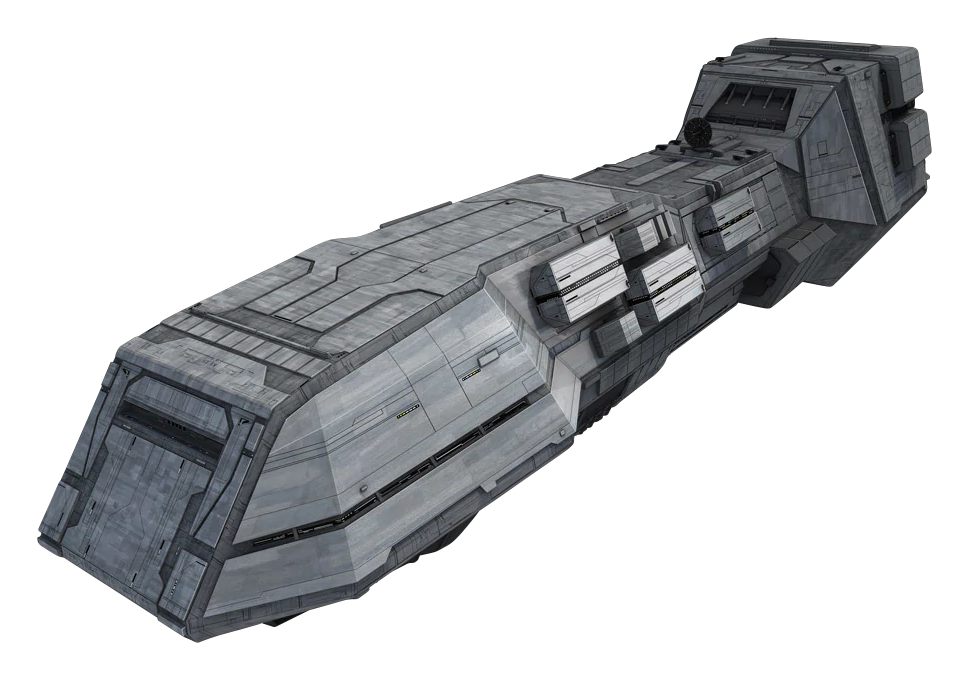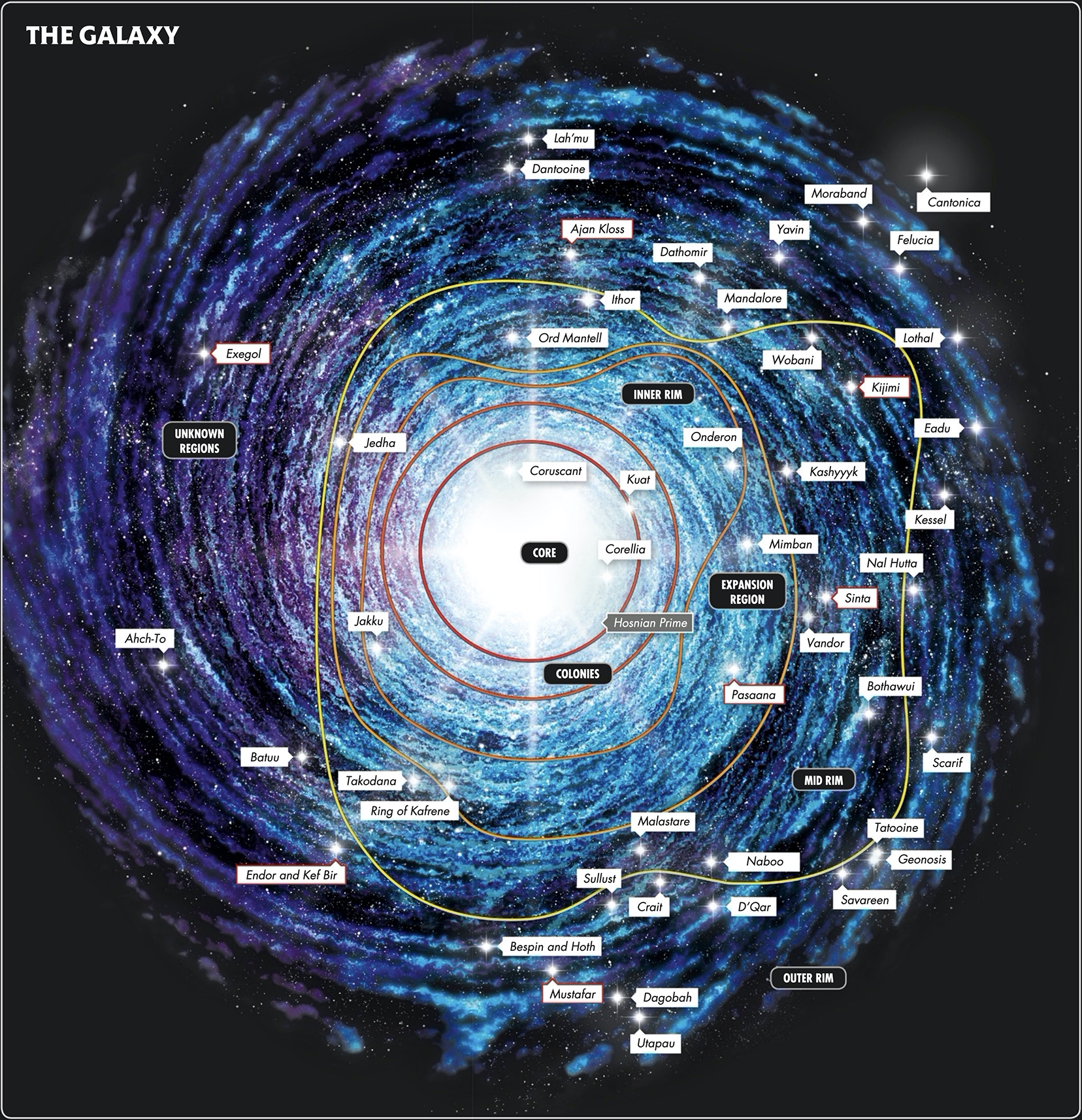Assault Frigates were multi-purpose warships in the Alliance Navy. During the civil war, many served as rebel command ships in the Outer Rim Territories, while others fulfilled a range of different roles, such as escorting larger ships, defending space and ground installations, and performing hit-and-run attacks on Imperial targets. Because the frigate could challenge a more powerful opponent in battle, the vessel was increasingly vital to rebel operations.

The Assault Frigate Mk II was derived from the Dreadnought-class cruiser (latter pictured).
At the onset of the Galactic Civil War, the Imperial Navy was the largest branch of the Galactic Empire's armed forces and its main arm of power projection. A single Star Destroyer of the Empire could subdue a rebellious planet, and its navy possessed over 25,000 Imperial-class Star Destroyers alone at the peak of its power. The fledgling Alliance to Restore the Republic amassed its own navy comprised of stolen, acquired, modified and self-manufactured craft. To bolster rebel naval assets, one of the starship classes retrofitted was the Republic Era Dreadnought class, which had been designed for heavy space combat and introduced prior to the Clone Wars that had begun in 22 BBY.
The result of this initiative was the capital ship known as the Assault Frigate Mark II, also named as the Assault Frigate Mk II, Mk II Assault Frigate, or Assault Frigate. The modifications considerably reduced the number of personnel required to operate the warship from 9,000—16,000 to 4,820. The new ship had improved maneuverability and speed, while maintaining a similar armament to that of the Dreadnought-class cruiser, permitting it to engage enemy capital ships well above its weight class. An Assault Frigate could outmaneuver a Star Destroyer, and two or three of these frigates could threaten a Star Destroyer.
The new Assault Frigate bore little resemblance to the Dreadnought-class cruiser. Much of the previous model's structure was altered or outright removed to enhance maneuverability and speed. Because these changes diminished the frigate's ability to endure damage, a potent shield system was installed to assist in compensating for the loss in durability. Rather than featuring the Dreadnought-class cruiser's oblong shape, the Assault Frigate had a bulbous hull with multiple protruding elements. The dorsal hull was shaped like a capsule, tall at amidships and tapering smoothly toward the bow and abruptly toward the stern. The ventral side possessed a flatter surface from the bow to the midsection, at which point a ventral stalk consisting of segmented pods extended from the hull. Connecting the dorsal and ventral surfaces, a recessed trench ran from the bow to amidships, marking the prow with a cavity. On the port side, the recessed portion continued along the stern bulge, from which two triangular fins jutted out from the main body; another fin was located on the starboard side. The frigate's engines, which emitted a red hue, were positioned at the rear behind the main dorsal capsule.
The Assault Frigate Mark II was manufactured by Rendili StarDrive, the same company that had manufactured the Dreadnought-class heavy cruisers. The frigate's price of 12,250,000 credits made it a costlier unit compared to its predecessor. The frigate had a hyperdrive system, with a Class 1 rating for primary function and a Class 12 rating for backup usage. It was also equipped with its powerful shield system, a medium-range sensor suite, and a navigation computer.
The Assault Frigate's new crew size was 4,820 officers and enlisted crew. The frigate's passenger capacity of 100 soldiers was also one-thirtieth of the Dreadnought-class cruiser's capacity of 3,000 troops. The Assault Frigate had a lower encumbrance capacity of 5,800 metric tons, but consumables for a longer period of 1.5 standard years.
Equipped with an armament similar to the considerable weaponry of the Dreadnought-class cruiser, the frigate boasted a large array of turbolaser batteries. Its armament included fifteen medium turbolaser batteries (five forward, five port, and five starboard); forty light turbolasers in ten quadruple mounts (five forward and five aft), which was half of the original eighty light turbolasers; and fifteen heavy laser cannons (five forward, five port, and five starboard), a higher quantity than the ten heavy lasers on board a Dreadnought-class ship.
The frigate had multiple internal hangars for ship's boats, assorted landspeeders, and shuttles, including a collection of small shuttles. Its dorsal docking mount could accommodate a dedicated assault shuttle or freighter for away teams or boarding parties. The ship additionally held either three starfighters, or one shuttle or landing craft, whereas the Dreadnought-class cruiser could house twelve starfighters in a dedicated hangar.
The Assault Frigate was a combatant for ship-to-ship naval warfare, including battle against much heavier capital ships. The frigates were used as command ships, escorts, defence ships for ground installations and space stations, and hit-and-run attack craft. An Assault Frigate could also serve as a central command post for a group of rebel operatives, or as a mobile resource that could be deployed at the request of a rebel cell against a particularly large Imperial target, such as a space station or warship.

During the war, many Assault Frigates anchored rebel fleets in the Outer Rim (galactic regions pictured).
During the Galactic Civil War, Assault Frigates filled a variety of tasks in the Alliance Navy. Many served as command ships in remote sectors in the Outer Rim Territories, normally escorted by a support fleet. Others were escorts for larger command ships. Assault Frigates were also assigned to defend ground bases and space stations. The Alliance maintained a task force of Assault Frigates, accompanied by several squadrons of starfighters for support, designated for hit-and-run attacks against isolated Imperial warships.
At one point in the war, a rebel task force containing Assault Frigates suffered losses on two consecutive missions. An unidentified transmission during a battle was detected, indicating that a saboteur was aboard one of the rebel ships. A team of rebel-affiliated operatives was ordered to catch the spy before the next battle or an even greater act of sabotage. In another incident, the Empire discovered the location of a rebel shipyard in the process of retrofitting an Assault Frigate, which could escape once its engines and hyperdrive were online. Rebel-affiliated agents were tasked with quickly repairing the ship or delaying the Empire's arrival.
Since the Assault Frigate's abilities were similar to the ethos of the Rebellion itself as a smaller force able to challenge and defeat a larger one, the warship was, during the conflict's early period, in the process of becoming a mainstay of the Alliance's operations.
In the current Star Wars canon, the Assault Frigate Mark II was introduced in the Star Wars Roleplaying sourcebook Starships and Speeders, published by Fantasy Flight Games in 2020. In the Star Wars Legends continuity, the Assault Frigate Mark II was first mentioned in its Databank entry "Alliance Assault Frigate (Mark II)" on StarWars.com and, as the Assault Frigate Mk. II, in the Prima Games guidebook Star Wars: Empire at War: Prima Official Game Guide, both of which were released on February 14, 2006. The Assault Frigate then made its first appearance in the video game Star Wars: Empire at War itself, which was developed by Petroglyph and released two days later on February 16, 2006.
- Starships and Speeders